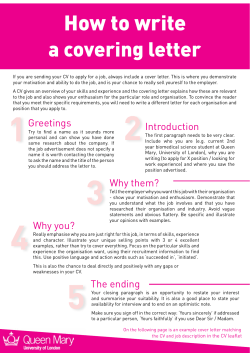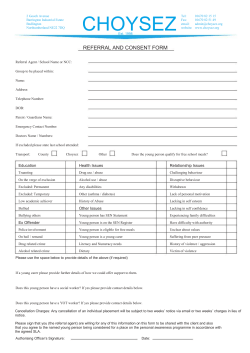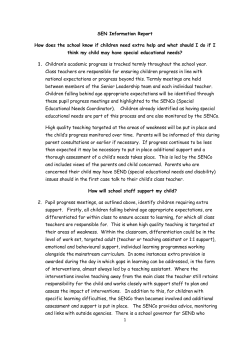
How to Decide on a Suitable School
How to Decide on a Suitable School FREEPOST RSSL RSSL--AJEZ AJEZ--ZSCZ PARENTS IN PARTNERSHIP SERVICE ROMFORD RM1 3SL Telephone: 01708 433885 Email: pips@havering.gov.uk Guidelines for Parents / Carers of Children with Special Educational Needs (SEN) Special Educational Needs, (SEN) Social Care and Learning London Borough of Havering Mercury House, Mercury Gardens Romford RM1 3SL Telephone: 01708 431885 JULY 2008 Your Questions The purpose of this leaflet is to provide you with the necessary advice on how to effectively identify a school that can meet your son or daughter’s needs, whether starting school for the first time or changing school for any reason. If your child has a Statement of special educational needs (SEN) and is moving on to a secondary school please request a copy of the leaflet “Transfer to Secondary School; A Guide for Parents of a Pupil with a Statement of SEN” from the Parents in Partnership Service. How many modern foreign languages will my child be expected to learn? What time does the school start and finish? Is it the same everyday? One of the questions we are most frequently asked is: How do I find the best school for my child?” The answer is that you probably won't know until you have tried it. There is no "best school" able to meet the needs of every child. All Havering schools have achieved success with a range of pupils covering the spectrum of special needs. As you would expect, the way in which an individual school operates can vary from school to school. This is no bad thing as it increases the chances of finding a school that is the “best fit” for your child’s individual learning needs and style. This question is usually closely followed by: ”Can the Parents in Partnership Service recommend an appropriate school for my child?” Of course we are not in a position to do that because we don't know your child, or have in depth knowledge of the schools in your area, or know what you are looking for in a school etc. However, we can help by providing you with guidelines on how to choose the right school. It is important to remember that a school that is perceived as having a good reputation for dealing with children with SEN is unlikely to be able to continue to succeed if it ends up with an imbalance of needs in its pupil population. The key to a school’s success in managing pupils with SEN is to keep the correct balance. 2 19 Your Questions Is there a parents’ group? What health or medical facilities does the school have? How would the school get to know my child before he/she starts there? How would my child get to know the school, especially in the first few days after starting? Are all areas of the school physically accessible or would adaptations (ramps, handrails etc.) be necessary? What help and support is available at lunchtimes, break-times and lesson changeovers? How easy will it be to get in touch with the school if; I have a concern? In an emergency? Does the school have a policy on giving medication? In line with Havering’s inclusive practice it is the intention of the local Authority (LA) to try wherever possible to educate children in mainstream schools. The law says that you have the right to "express a preference" for the school you wish your son or daughter to attend. This means that you can tell the LA which of the maintained schools in your area you would like them to go to. A maintained school is one that belongs to or is managed by an LA, i.e. your local primary, secondary or special school, but not an independent or private school. It is important that you note the difference between expressing a preference for a school and choosing a school. As a rule of thumb the LA generally agrees to name the school which is closest to your son/ daughter’s home that can meet his/her needs. In order to make this decision it is likely you may need help. The information included in this booklet is based on our experience of helping parents reach this decision. We appreciate that starting school for the first time or changing schools under any circumstances can be a very stressful time for parents as well as for the child. Havering Parents in Partnership Service will endeavour to offer support, advice and assistance with any part of the process BUT cannot get involved with Appeals procedures apart from providing you with relevant information. Depending on the circumstances, you will also be advised to contact ACE (Advisory Centre for Education) who can be contacted by writing to 1b Aberdeen Studios, 22 Highbury Grove, London N5 2EA; phone: 0808 800 5793; email: enquiries@ace.dialnet.com or SENDIST (Special Educational Needs and Disability Tribunal). SENDIST has a website: www.sendist.gov.uk but you can also obtain further details from us on how to contact them. Does the school operate a weekly/fortnightly timetable? 18 3 Other frequently asked questions Which schools meet which needs? In Havering there are a number of specially equipped schools to support children with particular needs. For further information about such schools you should ask the educational psychologist who is involved with your child. My child has SEN but is not Statemented, how do I go about choosing a school? This means they are on School Action or School Action Plus, you must apply in the usual way as all other children without statements. Applications to any school will be considered on the basis of the school's published admissions criteria (where applicable). They cannot refuse to admit any child on the grounds that he or she has SEN or does not have a Statement of SEN. Once you know which school your child will be going to, it is good practice for the SENCo of the new school to contact the SENCo of the current school (if applicable) to find out about the pupil's needs but that doesn’t mean you cannot meet with the new SENCo too. Of course if your child is starting school for the first time you may wish to make contact with the SENCo at the new school in order to give and receive information about your child's transition. If you need a Havering schools information brochure and application form you should contact Pupil Services at Scimitar House, 23 Eastern Rd, Romford, RM1 3NH on 01708 433928 What information would be helpful (ideally) before I visit a school? You may find it helpful to read some of the documents the school produces, for example: the School Brochure or Prospectus the Special Educational Needs Policy other school policies such as the Behaviour Policy or Equal Opportunities Policy the home/school agreement the Governors’ Annual Report to Parents a summary of the latest Ofsted Inspectors’ report. Reading through written information will give you an idea of what the school is like and help you identify any particular issues you might want to 4 Your Questions How would my child be encouraged to take part in out-of-class or school activities i.e. clubs and sports events? When and where do the above take place? Are the activities accessible? When? At lunchtime or after school? Is there a homework club? Is it lunchtime or after school? Is it everyday? Is it staffed? How often are written reports sent home? How would I be involved in the individual planning for my child’s special educational needs? How would I be kept up to date about what is happening in school? How are parents involved in school life? Does the school produce newsletters for parents? What sort of support and guidance does the school offer for parents? 17 Your Questions Other frequently asked questions How would the school make sure my child has the chance to take part in all areas of the curriculum? How does the school assess work and monitor progress? How regularly would my child’s progress be reviewed? Who will be involved in this? What happens if school staff feel my child is not making progress? What would happen if I feel my child is not making progress or if I have any concerns? What special arrangements are there for internal exams, tests and SATs? Think long-term. Does the school offer alternatives to GCSEs? What is the success rate? talk about. Think about the values and beliefs that you and your family hold and whether they fit with those of the school. Think about your views on discipline and your religious beliefs and practices. Talking to other parents and friends can also be helpful in giving you a general picture. You should use all of this information to help decide which schools are likely to best suit your child. How can I get the most out of visiting a school? There is no need to visit all schools (or go to all of the secondary open evenings) only those that you have a genuine interest in based on preference e.g. faith, single sex, “catchment area” etc. Try not to write off any schools based on rumour, reputation etc. but try to keep an open mind. Some schools follow up open evenings by organising a visit during a normal school day when you, and if possible your child, can see the day-today routine in action. Things to look out for and ask: a positive attitude from the staff towards the pupils how the pupils behave in class and around the school how classes are organised to see the class or year group your son or daughter would be in how much of the school is accessible, would adaptations be necessary (hand-rails, ramps, etc) any questions that occur to you how easy is it to get to the school How does the school make sure that all the children have equal opportunities to take part in school trips? Before you visit it maybe helpful to list the questions that you would like to ask. (See the back of the booklet, only select the ones that apply to your child’s individual needs) Schools that demonstrate an “I can” attitude, an enthusiasm to want to learn and be flexible, can sometimes work out even better than a school that has experienced a child with similar needs. Hopefully you will be able to get a "feel" for the school. Try to visit more than one school so that you are able to compare what each has to offer. 16 5 Other things to look out for On your first contact with the school and during the visit did you feel welcomed? Were the children looking busy and happy? Were they helpful and friendly? Did the classrooms look like bright and pleasant places where children can learn? Did the whole school look orderly and cared for and a safe place for your child? Were the corridor and toilet areas clean and tidy and accessible to your child? Were the displays current and interesting and did they seem to include work by pupils of all abilities? Did the staff seem interested in you and your child and in answering your questions? Would you like your child to spend his or her school days there? Your Questions How would other children be helped to understand my child’s special needs? How would my child be helped to make friends? When and how often are children taught out of the classroom? Is there a separate room for special needs? What equipment and resources are there? How does the school arrange extra support for children who need it? Is the extra support usually provided in the classroom, individually or in small groups? If your child has visited the school, how do they feel about being a pupil there? How does the school help children to learn how to behave and make the school a happy place? Does the behaviour system reward effort as well as success? What is the school’s experience of bullying? How would the school prevent my child from being bullied? 6 15 Your Questions Following up Does the school have any experience of helping children with similar difficulties to my child? How many other children in the school have special educational needs? What kinds of needs do they have? How is the school organised? By age? By ability? Subject groups? How might this change as my child gets older? How often would my child change class or move around the school? How many staff are there in the school? Teaching/support staff for SEN support? What specific training have staff had about; SEN? Specific medical conditions? What does the school do to make sure that all the staff know about my child’s individual needs? How many children would be in my child’s class? 14 It is unlikely that there would have been an opportunity to discuss your son or daughter’s individual needs with the school during an open evening or day. This being the case make a follow up appointment with the SENCo. You need to think carefully about whether you want to take your son or daughter along to this meeting. You may wish to take someone else with you such as a friend/relative or, alternatively, you could contact the Parents in Partnership Service to see if they can provide you with an Independent Parental Supporter (IPS) or Choice Adviser (for secondary transfer only). The role of the IPS or Choice Adviser is not to influence your decision, but to help you to think through the options and clarify your own thoughts. They can help you prepare for a visit, go with you and talk it over afterwards. Please contact the Parents in Partnership Service if you would like this kind of support. The school may wish to receive the relevant paperwork relating to your child’s special educational needs (SEN), including medical conditions to read through in advance of this. Don’t forget to include what you find helpful at home in working with them, and what tends to cause problems. This will enable the school to have a better understanding of your child's needs and together you can assess whether the provision they offer is appropriate. You will need to feel confident that your child will be able to learn in that environment and that the school will be able to support your son or daughter and meet their needs outside of the classroom as well as inside it. It also helps if you are able to picture how it will work. Many parents worry about the pace of schoolwork and that it maybe too stressful for their child. Although this is a fairly common fear it is mostly unfounded. You need to come away feeling that your child would fit in to the school and would thrive. Ideally parents should be treated as partners in a team working together with the professionals in the school for the good of their children. Your views and involvement should be equally valued. Is that the impression you came away with? 7 Following up Additional Tips Parents want different things from their child’s school, but it is useful to think about your visit afterwards and jot down impressions. These questions may help you: Do you feel that the staff have a positive attitude towards your son or daughter and that they will make the most of your child’s strengths and help them through any difficulties? Are you sure that the school can meet your child’s particular special educational needs? How confident was the school that they could meet your child’s particular special educational needs? Would the school be able to support your child’s strengths or interests? What did you feel positive about? Did the school’s way of working with parents seem close to the way you would like to work? Would you feel comfortable about approaching the school with any ideas or concerns? From the many discussions regarding this subject with parents over the past years, it appears that there are as many, if not more, concerns and anxieties on what happens outside the classroom as there are inside it. They include: Changing classes Getting lost Being late Getting detentions Meeting new people/making friends Homework Bullying Lunchtimes Break-times/playtimes Make sure you have found out about these too if they are of concern to you or your child. 8 When your child starts at the school Encourage him or her to talk to the family and friends about what has been happening at school, but pick your moment! When your child gets home from school, he or she is likely to be tired, hungry and ready for a break Show you’re pleased with any achievements If there are problems, talk about them with the school and try to work together to overcome them Be positive with the school about things that are going well Starting at school or changing school can be difficult for some children – try to keep the familiar routine going at home so that there is not too much change to cope with Establish a routine for week-days – checking the timetable, kit and any homework the night before, making sure your child gets enough sleep and is up in time for breakfast! You may find the questions at the back of this booklet helpful. Please just choose the ones that are relevant to your son or daughter’s particular needs and remember the SENCo may not have time to answer all your questions at the open evening. It may be worthwhile making a separate appointment. 13 Additional Tips Following up When you are shortlisting Take your child for a walk or drive to the school to point it out Go at different times, to see the children going in, playing outside, coming out If your child has a brother, sister or friend who goes or has been to the school, get them to talk about the good things about it Talk about the things that go on in the school that you know will interest your child – computers, music etc Before your child starts at the school If the school has a uniform, try to get everything that will be needed. If this is a problem, discuss it with the school – they may be able to help If you have any doubts, you might find it helps to write these down too. You can always talk to the school again about these points, asking different questions to gain more information. It is important to keep an open mind and consider several possibilities when trying to decide on a school. Talk to people who know you and your child before you make up your mind. There are advantages and disadvantages to most arrangements. There may not be an ideal school but there will be a best match. Although it may seem difficult to make the right decision in the end it may be that a very unscientific gut reaction is what’s called for i.e. trusting your instincts as a parent. Be positive about the school with your child – your attitude will be very important. If you have any serious concerns, discuss them with the school Keep calm and cheerful! If you are anxious, your child’s anxiety will increase If your child is nervous, reassure him or her that this is only natural Talk through any worries your child may have and what to do if things go wrong - practice particular scenarios Look through the school prospectus together and check out any rules and regulations Practice the journey a few times beforehand 12 9 Will my child get transport? How your son or daughter is going to get to and from school is an important part of considering the possible alternatives. The LA has to apply the same rules about transport to children with Statements as to all other children. In general transport is not provided for children with Statements unless it is specified in the Statement in Part 6 i.e. it is due to a need of the child rather than the family circumstances. If you live outside the LA’s walking distance, you could be provided with transport to what they regard as the nearest school able to meet your son or daughter’s needs. If in doubt the LA will be able to tell you which is the nearest school for your home address. Walking distance is measured by the shortest available route and is: Two miles for children under eight Three miles for children over eight If your child has a Statement and: the new school is the local secondary school, free transport will not be provided, unless he/she has such severe or profound difficulties that he/she is unable to walk/cycle or use public transport. your child has been allocated a school because you have stated a particular preference, other than the school recommended by the LA, free transport will not be provided. the new school is not the local secondary school, but has been recommended by the LA, it is likely that transport will be provided in line with Havering’s transport policy, copies of which are available from the SEN Section who can be contacted on 01708 431885. What else aids a successful transfer? A primary school which is proactive in identifying pupils who have high levels of anxieties regarding changing schools. Schools should plan how to overcome and allay such fears thus enabling the children to make a successful transition. For some pupils with very complex needs this process may need to start in Year 5 and indeed some parents may find it easier to look at secondary schools a year ahead for the same reasons. Good communication during Year 6 between the primary and the secondary school along with opportunities for pupils to familiarise themselves with the physical aspects of the new school and observe routines. This may help dispel some of the myths. Some secondary schools provide summer schools usually focussing on English and/or Maths. This can provide a sort of stepping stone and helps the new pupils familiarise themselves with certain aspects at least of their new school. In September they will be the leaders, as they will know where things are. It is important for parents to remember that if school doesn’t know there’s a problem or a concern they can’t help. Parents can expect schools to be proactive where frequent or prolonged absences occur in case they are anxiety linked to any aspect of school. It is our belief that every parent wants the best for their child and will strive to achieve that. If the Education Department agrees to provide transport, you will receive verification of this when you receive confirmation about which school has been allocated. If this is the case, shortly before the beginning of the Autumn Term you should receive details, in writing, of who will be transporting your child to his/her new school. 10 11
© Copyright 2025





















